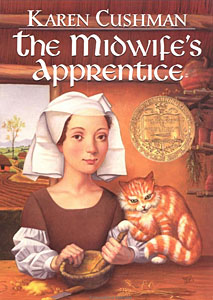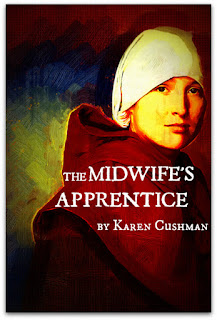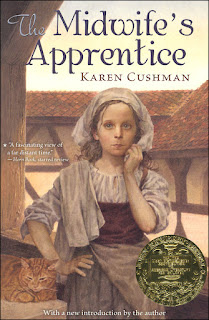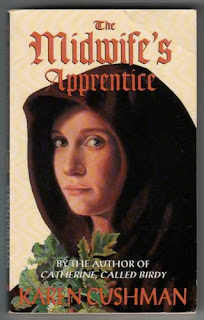To be completely honest, I actually forgot that this book even existed until, last week, I was packing up a load of my childhood books to go into storage while we renovate the house. I rifled through books I remembered and books I'd cherished for years: my endless copies of Lord of the Rings*, my battered Redwall paperbacks, the complete Anne of Green Gables box set... And nestled in with those books were some others that I had loved and reread and then somehow forgotten. Like The Midwife's Apprentice. Or A Walk in Wolf Wood, which we'll get to some other time. Fire in the Hills. Surviving the Applewhites. Troubling a Star.
So, like any good book nut, I scavenged these books out of the boxes and squirreled them away in my own current collection, figuring that at the very least I'll get a bit of blog mileage out of my nostalgia. Which brings us to now. I just reread The Midwife's Apprentice, and you know what?
I cannot believe I forgot about this book.
The Midwife's Apprentice, by Karen Cushman, came out in 1996, right when I was at the height of my "I must read everything that is vaguely interesting and written in English or a similar enough language" phase.** I don't remember how I picked it up or stumbled across it, all I know is that now, reading it again, I can see exactly why it appealed to little third-grade me and how it so quickly became the kind of book that shapes your identity and radically changes how you view yourself.
I'm really not kidding. Reading this book again was like getting a window into my own brain. I had never realized how much of my philosophy on life was taken from this one incredibly short little book about a scraggly girl in medieval England who falls into being a midwife. And it's funny because now I have to wonder at what other things have shaped me that I barely remember. What else is in my brain somewhere, lurking and affecting who I am? And what's in yours? I find that concept fascinating.
But enough about me. What about the book?
Well, like I said, The Midwife's Apprentice is very aptly titled. The main character of the story is a girl of about age thirteen named Brat, then Beetle, then Alyce. The girl is an orphan (probably), and has no memory of mother or father. At the start of the book she's barely alive, content to crawl into a dung heap to keep warm enough to live through the night. It's there in the heap that Jane the Midwife finds her. Jane the Midwife, or Jane Sharp as the girl comes to think of her, isn't exactly a nice person, and not even really that good, but she sees something in the girl in the dung heap, and so she takes the girl in.
Not for free, mind you. The girl, who Jane calls "Beetle" as in "Dung Beetle", has to work very hard for her pittance of a reward. She gets some scraps of bread and onion and cheese and a dry place to sleep, in exchange for which she sweeps Jane's floor, washes her linens, gathers herbs, and generally does all the sorts of things that no one wants to do for themselves.
It's while she does all of this that Beetle begins to come to some awareness of herself. Once her belly is mostly full, or at least full enough that her number one priority isn't finding some food to fend off starvation, she can think about other things. She thinks about how the boys in the village tease her. She doesn't like it. She thinks about how she hasn't got a name. She thinks - because she now has the freedom and time to do so - and she starts to wonder about her place in the world.
To be entirely honest with you, not that much happens in the book. It takes place over the course of about two years, and those years are, by most people's standards, uneventful. When Jane the Midwife breaks her ankle just before the fair, Beetle goes in her place, and it's at the fair that Beetle is given two very precious things: a comb for her hair and a compliment to go with it. For the first time, Beetle is called "a pretty young girl", but more importantly, for the first time, Beetle is acknowledged as a person and not just a walking piece of guttertrash.
It's also at the fair that Beetle is mistaken for a woman named Alyce, a woman who can read and write and who people look for in a crowd, and Beetle is so taken with the idea of being Alyce that she chooses the name for herself. In the village she demands that everyone call her Alyce, and even when they refuse and tease her, she keeps at it. She has a sense of herself now, and she refuses to back down from it.
The whole book, really, is an exploration of a young woman coming into herself as a person. At the start of it all, Brat (which is the only name she had before Jane the Midwife found her), is barely alive and barely a person. She is so focused on survival that anything past that is completely outside her understanding. But as she comes in from the cold and finds more and more of her physical needs met, she discovers that she is a person who wants to be loved and appreciated and to have a place in the world. That's really all the book is about, and it's definitely enough.
It's funny, because the book isn't very long and not a lot happens in it, but at the same time there's too much to describe here. Alyce's mutating relationships with the people in the village are one of the more interesting parts of the story. From her friendship with Will Russett the cowhand, a boy who used to torment her but who she saved from drowning, to her antagonism with the village baker, Alyce's life in the village is very fully realized. At one point Alyce rescues another miserable orphan without a name and sends him off to work at the manor, and it's a poignant moment when she realizes that she now has enough to be able to help others who are where she used to be.
Her relationship with Jane the Midwife is also appreciably complex. Jane doesn't want her apprentice stealing her customers and her work, but she also needs Alyce to learn enough of the trade to bring in more clients. Alyce, for her part, desperately wants to learn and grow and become a midwife, because then she could have a role and status and a place in the world.
This, then, forms the actual background of the story. As Alyce becomes a more accomplished apprentice, her relationship with Jane stiffens and strains. The final straw comes when Alyce, not Jane, is requested at a birth because Alyce, not Jane, was the one to deliver the mother's niece. Jane is furious at this betrayal, and Alyce is overjoyed, until she realizes that she can't do it. The baby is stuck and the mother will die and Alyce doesn't know what to do. She gives up and calls Jane, who saves the day, but Alyce is ruined. She's a failure and she can't bear having lost her one chance at a place in the world. So she runs away.
In running away, though, Alyce eventually finds more than she anticipated. She becomes a worker at the local inn and there she befriends a traveling scholar who teaches her to read. After living there for months, she even is forced one day to help a woman give birth, and when she manages it safely, Alyce realizes she wasn't a failure at all.
So, she goes back. That's the real sticking point of the book. Alyce goes back to Jane and knocks on her door and tells her flat out that she knows what she did wrong: she gave up. She won't give up now and she's ready to learn, and so Alyce becomes an apprentice again. And that's really where the book leaves it.
I guess you might be wondering why, with an ending that abrupt and a plotline that loose, this is a book I find so fundamental to my sense of self. And the answer basically comes down to...everything. I thought I'd have a pithy answer there, but the truth is that there isn't much in this book that I don't find really important.
Let's start with the basics: the plot is about a young girl who is cruelly mistreated by the world coming to find her identity and her place in the world through perseverance, tenacity, and humility. More than that, even, the book shows clearly how Alyce can't think about the higher questions of what she wants and who she is until she solves the lower necessities of eating and having a place to sleep and feeling safe. The book addresses larger existential questions, but it never lets you forget the importance of class in this - that without the economic ability to feed herself and sleep safely, Alyce would never think about this stuff or be Alyce at all. So there's that.
But there's also more complex and interesting stuff. Like I love how Alyce might need to get over some hurdles before she's ready to name herself and demand a place in the world, but she does get there. She can be very assertive and strong. She's willing to fight for what she wants.
Or how about the awesome message she sends at the end of the book when she begs Jane for her apprenticeship back. First off, Alyce is very humble about going back there, and you might not think that it's all that special for a guttergirl to be humble, but it would be easy for Alyce to cling to her pride and insist it's all she has left. Instead, Alyce just admits that she doesn't know everything but she knows she won't give up this time. That's a fantastic attitude.
And then there's how the story looks at the role of women in medieval society, or how class interacts with healthcare even in a feudal system, or the idea that kindness costs nothing and gains everything... Look, I'm just saying that you can open this book to just about any page and I could find something there that has radically shaped how I view the world. And, by and large, it's shaped it for the better.
I also want to give this book credit, though it's not something I remember noticing as a child, for having a very vague description of the main character. It's easy to miss because, well, there's so much else going on, but we really don't know much about Alyce's appearance at all. And that means that it's possible for this book to be read a lot of different ways. The only things we really know about Alyce are that her hair is black and curly, her eyes are big, and her skin is "white". But the skin thing is actually the least clear of all of them, as it's mentioned when Alyce washes with soap for the first time. So presumably it's more a comparison to the literal years of dirt that were on her before that.
What I'm saying is that this is the rare book where it's possible to read Alyce as a variety of different races. And that's not even historically inaccurate to do. We know now that there was an incredible level of diversity present in medieval Europe, including England, so it would be entirely possible for Alyce to be of African or Asian or Middle-Eastern descent. And while knowing that doesn't change the story in any substantial way, I know it does give the opportunity for anyone to identify with Alyce and find themselves in her. And that's awesome.
I, personally, always kind of pictured Alyce as Jewish. It wasn't until this most recent readthrough that I realized that, but I do. It took this reading for me to see that there's nothing in the text to support that conclusion (black curly/frizzy hair is basically the most common hair type on the planet, from what I can see), but I think it's kind of sweet that child me chose to read that into the text.
Anyway, I'm getting off topic. My point is this: The Midwife's Apprentice is a really good book. And it has a really good point. Not every book has to have a clear plot structure and defined storylines and a solid presentation. Sometimes it's okay for a book to meander through some character development. That's okay too. But mostly, I wish I hadn't forgotten how much I love this book. It's fantastic and it's a huge part of why I am the person I am today.
And that is far from nothing.
*Not an exaggeration. I counted at one point that I alone owned five different editions of the books, while my family owned a ridiculous ten versions. For four people.
**Also not an exaggeration. I used to hoard German and Dutch books on the basic premise that I would probably be able to read them eventually if I just tried hard enough. As it turns out, I now speak a fair amount of German, so that wasn't a terrible plan. I mean, not great, but not terrible.







CALLL GIRL kolkata
ReplyDeleteFEMALE CALL GIRLS KOLKATA
FEMALE CALL GIRLS
SEXY CALL GIRLS SERVICE IN KOLKATA
ESCORTS SERVICE IN KOLKATA
KOLKATA FEMALE ESCORT SERVICE
TOP ESCORTS SERVICE KOLKATA
BEST KOLKATA ESCORTS SERVICE
CALL GIRLS SERVICE
ESCORTS SERVICE
ESCORT SERVICE
ESCORTS SERVICE IN KOLKATA
BENGOLI ESCORTS GIRLS
BENGOLI CALL GIRLS KOLKATA
KOLKATA ESCORTS SERVICE
FREE ESCORTS SERVICE KOLKATA
FREE WHATSAAP NUMBER ESCORTS
FREE WHATSAAP NUMBER OF CALL GIRLS
PHONE NUMBER OF ESCORTS SERVICE
FREE PHONE NUMBER ESCORTS SERVICE
MOBILE NUMBER OF ESCORTS SERVICE